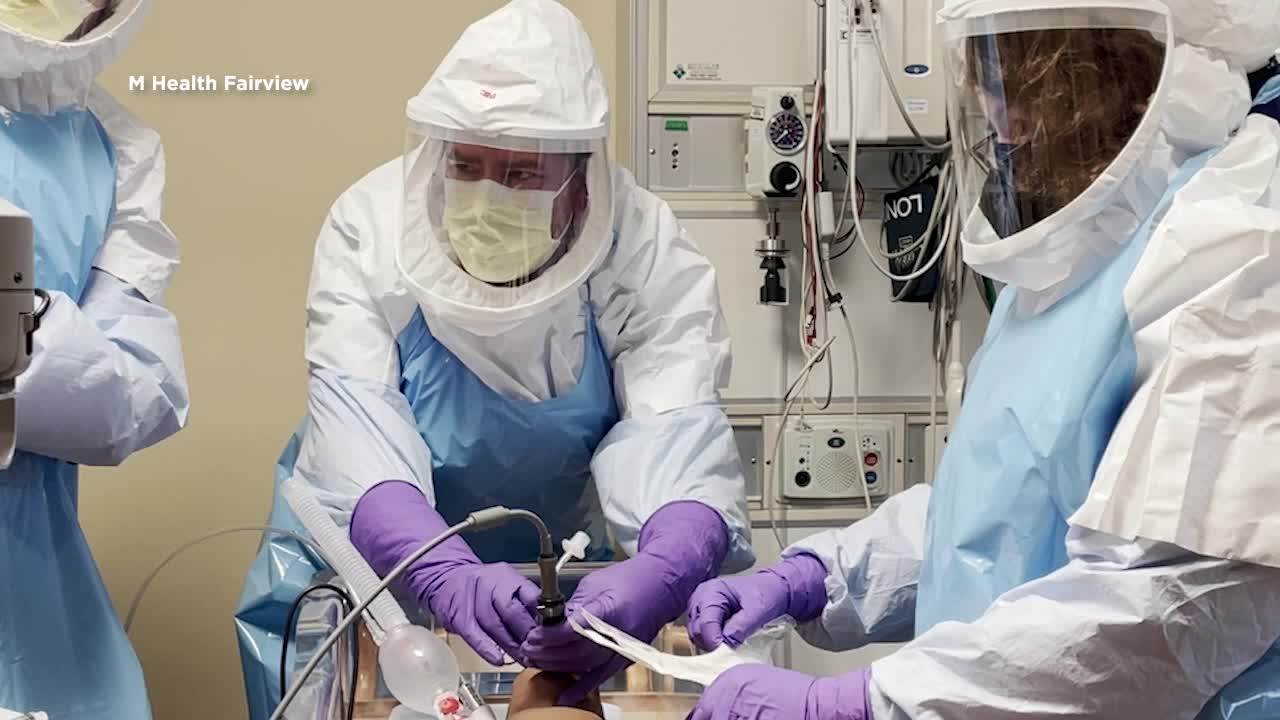An inside look at M Health Fairview’s Special Pathogens Unit
[anvplayer video=”5148462″ station=”998122″]
As the first Ebola vaccines are expected to arrive in Uganda, physicians at M Health Fairview University of Minnesota Medical Center are preparing for potential cases.
“That’s why we have to stay prepared and why we have to do these drills with our staff on a regular basis,” said Dr. Susan Kline, the medical director of the Special Pathogens Unit.
She gave 5 EYEWITNESS NEWS a rare glimpse into the quarterly training exercises she conducts with a team of physicians. They practiced donning and doffing personal protection equipment, which is critical protocol in a unit designed to treat patients with highly contagious illnesses.
“For example, there could be Ebola on the floor. You want to make sure you take off those contaminated booties before you step into the clean hallway,” Kline said. “We’re very cautious to keep any infectious material inside the patient rooms.”
They also practiced placing a breathing tube in both adult and infant patients during a simulation in which a pregnant Ebola patient is admitted to the hospital.

Physicians at M Health Fairview's Special Pathogens Unit practice intubating an infant patient. (Courtesy of M Health Fairview)
“Being able to make sure we have enough dexterity, visualize it well enough with all of the equipment on,” said Dr. Tate Gisslen, a neonatologist who recently joined the team. “Hearing is hard. It’s a lot more hot.”
He explained that patients also have an added level of complexity.
“Knowing how contagious the disease is for everyone around, knowing that the patient’s quite ill to start with makes it a lot more challenging,” Gisslen said.
The unit opened in 2014 in response to an Ebola outbreak that affected West Africa. It was announced as a federally designated Regional Treatment Center for Ebola and Other Special Pathogens in 2015, with funding arriving in 2016.
The medical center is one of only 13 federally designated sites nationwide.
Until this fall, it was the only site in a six-state region including Minnesota, Wisconsin, Illinois, Michigan, Ohio and Indiana. An additional site has now been funded in Michigan.
“We know the responsibility that comes with it,” Kline said. “We have to work to be prepared to care for Ebola or another special pathogen or a new emerging pathogen we’re not aware of.”
The M Health Fairview University of Minnesota team brings together doctors with different specialties and different experience levels.
During the last Ebola outbreak, they treated fewer than six patients under investigation for the illness, according to Kline.
“The current outbreak that’s going on in Uganda right now is quite a bit smaller than the very large West Africa outbreak, which was thousands of patients,” she said.
Still, they are prepared to treat any patients that need care.
The unit has two high-level isolation rooms plus an adjacent ICU with 10 beds. It also features its own lab for processing samples, which is located across the hall from patient rooms.
All of the spaces are equipped with negative airflow capabilities, which means air is filtered out of the patient room to the outdoors so it doesn’t circulate in the hospital.
“We know that any type of patient might show up at our hospital,” Kline said. “We want to be prepared for all of those different scenarios.”
The team has also been active in the COVID-19 pandemic response over the past two years. When the disease hit Minnesota in March 2020, her team helped get Bethesda Hospital established as a COVID facility. It was retrofitted with negative airflow technology, which is used at the Special Pathogens Unit. They also utilized their training during the pandemic response.
Kline said they continue to train to be prepared for what is still ahead.
“We want to make sure we can provide good patient care,” she said.
The Special Pathogens Unit received an additional $1.2 million in federal funding last month.